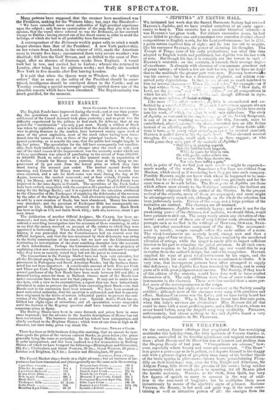'5 '5 AT EXETER HALL.
WE intimated last week that the Sacred Harmonic Society had revived HANDEL'S Jephtha, and we have availed ourselves of an early oppor- tunity to hear it. This oratorio has a peculiar historical interest—it was HANDEL'S last great work. For sixteen successive years, he had never failed to produce one and sometimes two oratorios or other choral compositions to English words, for his Lent performances : but in 1751, a gutta serene deprived him of sight; and he was too old to acquire, like his successor STANLEY' the power of dictating his thoughts. The Trionfo di Tempo (one of his early productions) was after this time adapted to English words and performed, but Jephtha was his last work of note. But though his last, it is certainly not the lowest in rank of HANDEL'S oratorios : on the contrary, it exceeds their average degree of excellence. It abounds with choruses of consummate grandeur and of great variety ; of which a few are well known, but we have no doupt that to the multitude the greater part were new. HANDEL borrowedlts was his custom ; but he was a dexterous plagiarist, and seldom com- mitted petty depredations. In fact, we ar, ala.ost as much indebted to him for several choruses—" When Li. loud vice," for example—as if he had written them. " No more to A mason's God," "How dark, 0 Lord, are thy d.terees," and " Ths : oblime," are all compositions in which his mightr laiwer is pot firth; and, though different in style, they are masterpieces of choral-writing.
Like most of Ls other oratorio,, Jephtha is encumbered and en- feebled by a wretched libretto. IT ,N Fm's jouttne2tman appears always to have thought it rit!:.ess ■ry to ' tome impertinent love-story into his work, of which the elect ;, ' anly ridiculous. The story of Jephtha, as narrated in the .ituple of the .Jewish Scriptures, is one of its most touching naricti, : at this, forsooth, must be embellished, altered, enlarged—in short, converted into an idle fiction instead of an affecting reality. The consequence of these feeble addi- tions is here, as in every other oratorio, to lower its musical standard. HANDEL is pulled down to his rhynter's level. What elevated musical thoughts, for example, could such words as these suggest; or who would guess they were part of the oratorio of Jephtha ?
"Dull delay in piercing anguish
Bids thy faithful lover languish,
White he pants for bliss in vain.
Oh with gentle smiles relieve me,
Let no more false hope deceive me,
Nor vain fears inflict a pain." And, in point of fact, we find just such music as might be expected— music worthy of the words. Sometimes a few lines are cribbed from MILToN, which stand as if wondering how they got into such company. Possibly liatenEL might not know with whom he happened to be asso- ciated, but he evidently felt his power, and rose, precisely and for the same reason as he sank before. The finest parts of Jeplaha are those which adhere most closely to the Scripture narrative ; the feeblest are those which originate with the author of the libretto. In the present revival of the oratorio, many of these are expunged; and more might be advantageously struck out, although on the whole the selection has been judiciously made. Eleven of the songs and a large portion of the recitative are omitted. The choruses are all retained.
In performance, Jephtha is certainly heavy ; and were it not for the awakening power of the choruses, few auditors, we should think, would have patience to sit it out. The songs rarely attain any elevation of cha- racter; and several of them are of very inferior rank, abounding with passages such as we find in the writings of HOWARD, OSWALD, STAN- LEY, and other second-rate composers of the day. The accompani- ment is, usually, meagre enough—often the mere outline of a score. The wind-instruments are scarcely heard, except now and then a solitary pipe of flute or oboe. The ear is thus wearied by the unrelieved vibration of strings, while the singer is rarely able to impart sufficient interest to his part to stimulate the jaded attention. In all such cases, the score requires to be judiciously filled up : nor would this be any deviation from the author's design, but rather its completion. HANDEL supplied his want of good wind-instruments by his organ, and the skeleton which his score exhibits he was accustomed to clothe. It is very true, that incompetent persons have often attempted to supply this deficiency ; but Jephtha has been rescored by MOSEL, and in many parts of it with great judgment and success. The Society, if they knew of this edition of the oratorio, would have done well to have availed themselves of it. The only additions were those of mere noise—brass instruments in the choruses. These were less needed than a more per- fect score of the accompaniments to the songs.
The performance, last night, was not so correct as the Society usually exhibits ; although most of the choruses were sung with precision and effect. Madame CARADORI was the lphis ; and we have rarely heard her sing more beautifully. Why is Miss Biwa thrust into first-rate parts, when this lady's services are obtainable ? Miss MassoNt did all that could be done with a most profitless part ; and a Miss Cum.rr, whom we never heard before, sang the Angel's song very creditably. Puma:es, unfortunately, had almost nothing to do ; and Jephtha found a very inadequate representative in Mr. PEARSALL.


























 Previous page
Previous page